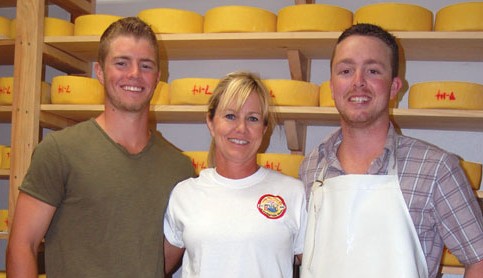Next time you are perusing the farmers markets of Sonoma County,
pay close attention to your local cheese vendors. These craftsmen
and women have made a special place for themselves in the county
foodshed and are blazing the trails for the next type of tours and
tastings. So, set your wine glass down and pick-up your
toothpick.
SHEEP CHEESE:
Weirauch Farm & Creamery
Petaluma, CA.
Eight years ago, Joel Weirauch left Sonoma County bound for
France to study the art of cheese making. While abroad tasting and
testing recipes, Joel discovered his love for sheep’s cheese. After
a year of study, he returned home to start his own cheese making
business in Petaluma.
Joel and his wife Carleen have since leased a property, built a
mobile creamery and are finishing up their milking parlor with a
plan to focus on farmstead raw milk cheese, meaning cheese made on
their farm with non-pasteurized milk from their sheep herd.
“It is a unique situation where we are not investing in the
infrastructure of the property,” Weirauch said of his mobile units
and portable sheep housing that can move his cheese business
anywhere.
The Weirauch’s are currently crafting cow’s milk cheese until
their milking parlor is complete and they can begin collecting milk
from their sheep heard. The pasteurized cow’s milk cheeses, that
are available now, are softer and younger cheeses whereas the
sheep’s cheese will be a raw cheese that is firmer and needs to be
aged over 60 days.
“Sheep are seasonal milkers so five or six months out of the
year we will get sheep milk and during the off season we will make
cow milk cheese,” Weirauch explained. “And with our sheep we will
make primarily raw milk cheeses.”
Sheep’s milk is higher in fat than goat or cow milk, producing
richer artesian cheeses. Most commonly sheep’s milk is used to
craft Roquefort, pecorino and manchego.
If you stop by the Sebastopol Farmer’s Market you can sample
some of the cow’s milk cheeses in flavors of Herbs de Provence and
harissa chili. Keep an eye on this little creamery for sheep
cheeses in the spring.
COW:
Valley Ford Cheese Co.
Valley Ford, CA.
Just outside the town of Valley Ford, down a long gravel road
leading to the top of the grassy hills above the Estero Americano
Preserve, sits Mountain View Jerseys Dairy where cheese-maker Karen
Bianchi-Moreda and her family operate their cheese business.
The dairy has been in the family for five generations, since the
early 1900’s when Bianchi’s great-grandparents immigrated from
Northern Italy. Since then, Karen, her father Paul, brother Steve,
and Karen’s two sons Joe Moreda Jr. and Jim Moreda have all worked
together to maintain a sustainable ranch and produce over 1,200
pounds of cheese a week.
“It is the hardest thing to explain,” Bianchi said about the
flavors of the cheese that remind her of her childhood that she has
recreated in her hand-made style of Asiago and Fontina. “I was
maybe twelve and that cheese was what was on the table but I don’t
know what it was.”
Bianchi took classes and experimented with recipes until she was
able to recreate those tastes of growing up. She shares them at
farmers markets across the county noting that on any given week,
her family is setting their both up at least five or six times.
In just two years, the Valley Ford Cheese Company has added on
to their creamery and expanded their operation to meet their
demand. Every day Bianchi and her boys can be found mixing recipes,
spraying down aging cheese rounds and hand-wrapping ready wedges to
go to market. If you stop by their booth this month you may have a
chance to taste their limited edition cheese.
GOAT CHEESE:
Bodega Artisan Cheese
Bodega, CA.
Past the town of Bodega, winding up the slim grass lined hills
of the coast, Patty Karlin of Bodega Goat Ranch handcrafts six
different types of goat cheese.
Whether its creamy ricotta made for dessert or her ‘country
cottage,’ ideal for cooking, all of the cheese is made with milk
that is no more than two days old, which Karlin says prevents the
cheeses from having a strong goat flavor.
Goat’s milk cheeses are easier to digest than other cheeses and
are a good option for people allergic to cow’s milk. Goat’s milk is
high in calcium and protein, low in fat, and a good source of
vitamins A, B and K.
“There was a revolution in wine that brought us the Napa Valley
back in the 60s and 70s where we went from Martinelli to the
fabulous wines we have now that are winning international contests
and that is what is happening now with cheese,” Patty said. “What
people don’t realize is there are some fabulous artisan cheese
making going on in small batches that are supplying local
restaurants and wineries.”
For the past 12 years Karlin has been touring school groups,
seniors, bicycle tours and just curious people on her property
teaching them about goats, sustainable agriculture and cheese
making. Her eco-tours also teach visitors about solar-rain
catchment, permaculture, the on-site feeding program for the goats,
and her teen-farming program. The tour ends with a visit to the
animals, the aging room and a cheese tasting.
Pre-arranged group tours are an hour and a half and costs $15
per person minimum five people per tour. Call 876-3483 to make
reservations or email Karlin at bd******@***ic.net.









